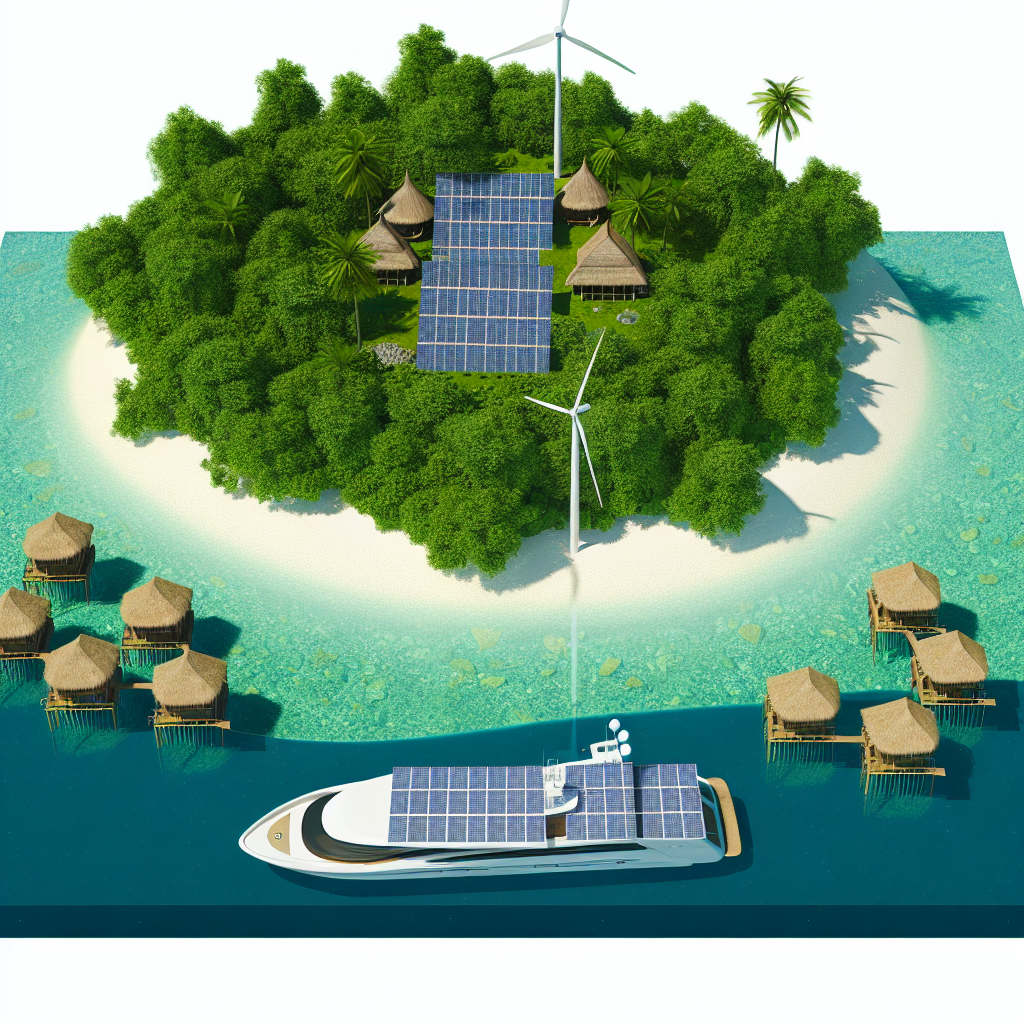Sustainable Luxury: Carbon-Neutral Private Islands
Introduction: The Future of Luxury is Green
Luxury has long been associated with excess, but in today’s evolving world, opulence is taking on a new, eco-conscious dimension. The ultra-wealthy are no longer content with grandeur alone—they increasingly demand sustainability alongside extravagance. Enter carbon-neutral private islands, a futuristic vision of affluence that aligns with Earth’s well-being.
These exclusive retreats offer the pinnacle of comfort and privacy while maintaining a net-zero carbon footprint. Thanks to innovative technologies, sustainable architecture, and regenerative environmental practices, these paradises provide guilt-free indulgence for the environmentally conscious elite. From solar-powered villas and desalination plants to organic on-island farming and marine conservation projects, everything about a modern carbon-neutral private island is designed to exist in harmony with nature.
According to the United Nations Environment Programme (UNEP), traditional tourism accounts for approximately 8% of global carbon emissions. High-end travel, including private jets and luxury resorts, contributes significantly to this footprint. This reality has led visionary developers and conservation-focused billionaires to rethink the concept of isolated getaways. Their solution? Private sanctuaries designed with sustainability at their core, leveraging cutting-edge science to balance extravagance with ecological responsibility.
From the Maldives and Fiji to the Caribbean and the South Pacific, the rise of carbon-neutral private islands is shaping the future of sustainable luxury. These paradises not only offer state-of-the-art eco-lodges but also implement energy-efficient systems, wildlife preservation efforts, and reef restoration projects. The result? A serene, self-sufficient escape that allows guests to revel in high-end opulence without leaving an environmental footprint.
But how exactly do these islands work? What technologies support their sustainability credentials, and what role do researchers and experts play in their development? Let’s explore the key innovations that are making carbon-neutral private islands a revolutionary part of the luxury travel industry.
Key Features of Carbon-Neutral Private Islands
Powered by Nature: Renewable Energy & Carbon Offset Solutions
Carbon-neutral private islands rely heavily on renewable energy sources, including solar, wind, and hydroelectric power. The implementation of microgrids ensures 24/7 electricity availability while minimizing dependence on fossil fuels.
According to a 2021 report by the International Renewable Energy Agency (IRENA), small-scale renewable systems have the potential to reduce island carbon emissions by up to 85% [(IRENA, 2021)](https://www.irena.org/publications/2021/Sep/Renewable-energy-for-island-tourism). These private islands also utilize carbon offset mechanisms, such as reforestation and marine conservation, to maintain their carbon-neutral status.
Eco-Friendly Elegance: Sustainable Architecture & Smart Water Systems
The design of eco-luxury islands incorporates passive cooling techniques, innovative insulation, and locally sourced, sustainable materials. Advances in green architecture help minimize energy waste and enhance biophilic aesthetics that blend with the natural landscape [(World Green Building Council, 2022)](https://www.worldgbc.org/).
Water sustainability is a cornerstone of carbon-neutral islands. Many of these havens integrate desalination plants powered by renewable energy, converting seawater into fresh, potable water without excessive carbon emissions. According to the Pacific Institute, energy-efficient desalination technologies reduce greenhouse gas emissions associated with freshwater production by nearly 40% [(Pacific Institute, 2020)](https://pacinst.org/publication/desalination-energy-emissions/).
Preserving Paradise: Biodiversity Conservation & Regenerative Practices
Protecting biodiversity is fundamental to carbon-neutral private islands. Many have partnered with marine biologists and conservation organizations to safeguard endangered species, restore coral reef ecosystems, and implement sustainable fishing policies.
Studies published by the Global Coral Reef Alliance indicate that artificial reef structures and coral transplantation projects can enhance marine biodiversity by up to 70% within five years [(Global Coral Reef Alliance, 2021)](http://globalcoral.org/).
Regenerative farming also plays a role on these exclusive islands. Organic gardens, permaculture farms, and self-sustaining ecosystems provide fresh, chemical-free produce while improving local soil health and carbon sequestration. Research from the Rodale Institute suggests that regenerative farming can sequester as much as 1.5 metric tons of CO₂ per acre annually, underscoring its role in environmental sustainability [(Rodale Institute, 2022)](https://rodaleinstitute.org/science/articles/regenerative-agriculture-and-climate-change/).
Luxury Without Limits: Eco-Conscious Indulgence
Despite their rigorous sustainability principles, carbon-neutral private islands remain synonymous with ultra-luxury. Guests enjoy world-class amenities, Michelin-star dining sourced from hyper-local ingredients, and lavish eco-friendly spas.
Additionally, bespoke experiences such as guided marine expeditions, sustainable yachting, and immersive cultural exchanges create an unparalleled level of hospitality—proving that environmental responsibility and opulence can coexist seamlessly.
Conclusion: Where Sustainability Meets Supreme Luxury
As the demand for sustainable luxury grows, carbon-neutral private islands stand as a beacon of responsible excess. These extraordinary destinations redefine what it means to live lavishly, ensuring that indulgence does not come at the expense of the environment.
With advancements in green technology, conservation efforts, and renewable energy, the dream of a guilt-free paradise is now a reality. For discerning travelers who seek both exclusivity and ecological integrity, carbon-neutral private islands offer the ultimate experience—where luxury meets sustainability in its purest form.
**Summary:**
Carbon-neutral private islands are redefining the future of sustainable luxury, offering high-end amenities and experiences while maintaining a net-zero carbon footprint. These exclusive retreats leverage cutting-edge technologies, renewable energy sources, and regenerative environmental practices to provide guilt-free indulgence for the environmentally conscious elite. By partnering with experts and implementing innovative solutions, these islands are shaping a new era of responsible excess, where luxury and sustainability coexist seamlessly.
**References:**
– [International Renewable Energy Agency (2021). Renewable Energy for Island Tourism.](https://www.irena.org/publications/2021/Sep/Renewable-energy-for-island-tourism)
– [World Green Building Council (2022). Sustainable Building in Luxury Hospitality.](https://www.worldgbc.org/)
– [Pacific Institute (2020). Sustainable Desalination and Water Efficiency.](https://pacinst.org/publication/desalination-energy-emissions/)
– [Global Coral Reef Alliance (2021). Coral Reef Regeneration and Marine Biodiversity Enhancement.](http://globalcoral.org/)
– [Rodale Institute (2022). Regenerative Agriculture and Climate Change.](https://rodaleinstitute.org/science/articles/regenerative-agriculture-and-climate-change/)

Dominic E. is a passionate filmmaker navigating the exciting intersection of art and science. By day, he delves into the complexities of the human body as a full-time medical writer, meticulously translating intricate medical concepts into accessible and engaging narratives. By night, he explores the boundless realm of cinematic storytelling, crafting narratives that evoke emotion and challenge perspectives. Film Student and Full-time Medical Writer for ContentVendor.com




